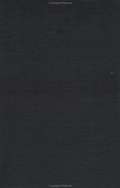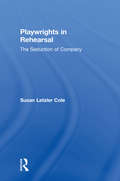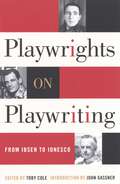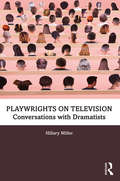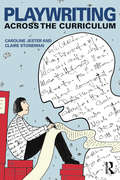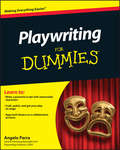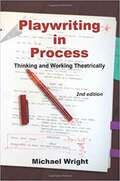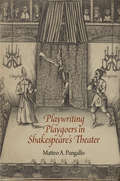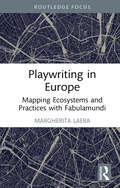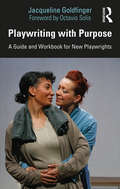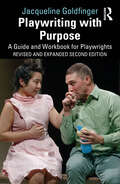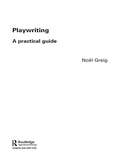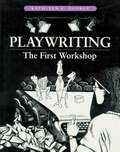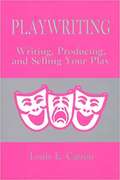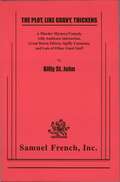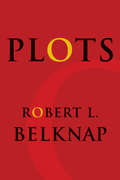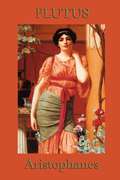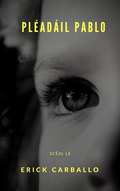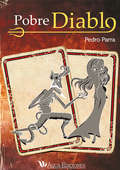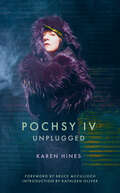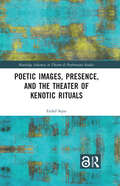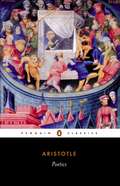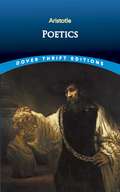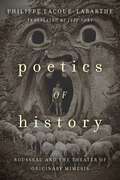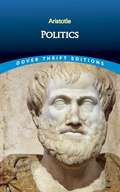- Table View
- List View
Playwrights in Rehearsal: The Seduction of Company
by Susan Letzler ColePlaywrights in Rehearsal is an inside look at the writer's role in the creative process of bringing his or her words to life on stage. Susan Letzler Cole, granted rare access to some of the major playwrights of our time, recounts the participation in rehearsal of Arthur Miller, Sam Shepard, Tony Kushner, Suzan-Lori Parks, and others. She follows these writers from staged readings in small rooms to season-opening world premieres, as they work with such acclaimed directors as Joseph Chaikin, Mark Lamos, James Houghton, and Garland Wright, and with such distinguished actors as Kathleen Chalfant, Ellen McLaughlin, Charlayne Woodward, and Joseph Wiseman. Seeking to understand the playwright's role in the collaborative process of rewriting the script during rehearsal, Susan Cole examines the relation between the author's revision of the text and the director's reimagining of the script. Playwrights in Rehearsal vividly depicts both the pleasures and the tensions of playwrights working in company with actors, dramaturgs, and directors. In this revealing book, we see eight playwrights--who vary widely in age, fame, and dramatic technique--responding to the questions and dealing with the anxieties of their collaborators. As we watch and listen, and these writers watch and listen, plays come to life.
Playwrights in Rehearsal: The Seduction of Company
by Susan Letzler ColePlaywrights in Rehearsal is an inside look at the writer's role in the creative process of bringing his or her words to life on stage. Susan Letzler Cole, granted rare access to some of the major playwrights of our time, recounts her participation in rehearsal with Arthur Miller, Sam Shepard, Tony Kushner and Suzan-Lori Parks, and others.
Playwrights on Playwriting: From Ibsen to Ionesco
by Toby ColeFor anyone interested in drama, Playwrights on Playwriting: From Ibsen to Ionesco offers revealing and astute insights on modern theater and the creation of plays. The book gathers the opinions and theories of the greatest names in the past 200 years of drama, among them Anton Chekhov, George Bernard Shaw, Federico Garcia Lorca, Eugene O'Neill, Bertolt Brecht, Tenessee Williams, Sean O'Casey, and Arthur Miller, to name a few. In the first part of the book, "Credos and Concepts," the playwrights offer their differing philosophies on the dynamics of theatrical performance and the changes in drama since Aristotle. In the second part, "Creations," the same dramatists look at specific plays of their own, commenting on their intended goals and the works' overall success. A unique and enlightening collection, Playwrights on Playwriting is an essential resource for the enthusiast of theater.
Playwrights on Television: Conversations with Dramatists
by Hillary MillerPlaywrights on Television features interviews with writers of award-winning stage plays and celebrated television shows reflecting on the successes and challenges of being a playwright in the post-network television era. In these conversations, eighteen dramatists consider their professional paths and creative choices, from training and education to thoughts on craft and technique, and discuss a range of issues relevant to the development of dramatic writing today. Theatergoers and TV aficionados alike will find new perspectives on the journeys traveled by some of their favorite plays and series, such as The Affair, The Americans, Boardwalk Empire, GLOW, House of Cards, Insecure, Mad Men, Orange Is the New Black, Shameless, She’s Gotta Have It, Vida, and The West Wing. A valuable resource for aspiring stage and television writers, as well as theater and media scholars investigating the works of these dramatists, Playwrights on Television sheds light on the role of the contemporary playwright in the latest Golden Age of television.
Playwriting Across The Curriculum
by Claire Stoneman Caroline JesterFirst Published in 2012. Routledge is an imprint of Taylor & Francis, an informa company.
Playwriting For Dummies
by Angelo ParraThe easy way to craft, polish, and get your play on stage Getting a play written and produced is a daunting process. From crystallizing story ideas, formatting the script, understanding the roles of the director stagecraft people, to marketing and financing your project, and incorporating professional insights on writing, there are plenty of ins and outs that every aspiring playwright needs to know. But where can you turn for guidance? Playwriting For Dummies helps any writer at any stage of the process hone their craft and create the most dramatic and effective pieces. Guides you through every process of playwriting?from soliloquies, church skits, and one act plays to big Broadway musicals Advice on moving your script to the public stage Guidance on navigating loopholes If you're an aspiring playwright looking to begin the process, or have already penned a masterpiece and need trusted advice to bring it into the spotlight, Playwriting For Dummies has you covered.
Playwriting In Process: Thinking And Working Theatrically
by Michael WrightPlaywriting in Process: Thinking and Working Theatrically is written to encourage new and experienced playwrights to build techniques for a greater range of creative expression in writing for the stage. The book uses exercises to guide playwrights towards thinking and working theatrically. The exercises help playwrights start or revise their work by providing alternate ways of thinking about their subject and their processes. New to the second edition: new exercises, a general updating such as the use of the internet, a new chapter for teachers and playwriting group leaders on using this book in class, and end-of-chapter "Call Out" exercises. Useful for playwrights at all levels.
Playwriting Playgoers in Shakespeare's Theater
by Matteo A. PangalloAmong the dramatists who wrote for the professional playhouses of early modern London was a small group of writers who were neither members of the commercial theater industry writing to make a living nor aristocratic amateurs dipping their toes in theatrical waters for social or political prestige. Instead, they were largely working- and middle-class amateurs who had learned most of what they knew about drama from being members of the audience.Using a range of familiar and lesser-known print and manuscript plays, as well as literary accounts and documentary evidence, Playwriting Playgoers in Shakespeare's Theater shows how these playgoers wrote and revised to address what they assumed to be the needs of actors, readers, and the Master of the Revels; how they understood playhouse materials and practices; and how they crafted poetry for theatrical effects. The book also situates them in the context of the period's concepts of, and attitudes toward, playgoers' participation in the activity of playmaking.Plays by playgoers such as the rogue East India Company clerk Walter Mountfort or the highwayman John Clavell invite us into the creative imaginations of spectators, revealing what certain audience members wanted to see and how they thought actors might stage it. By reading Shakespeare's theater through these playgoers' works, Matteo Pangallo contributes a new category of evidence to our understanding of the relationships between the early modern stage, its plays, and its audiences. More broadly, he shows how the rise of England's first commercialized culture industry also gave rise to the first generation of participatory consumers and their attempts to engage with mainstream culture by writing early modern "fan fiction."
Playwriting in Europe: Mapping Ecosystems and Practices with Fabulamundi (Routledge Advances in Theatre & Performance Studies)
by Margherita LaeraThis book maps contemporary playwriting and theatre translation practices and ecologies in the European continent. Whether you are a scholar researching contemporary drama and translation, or a theatre practitioner looking for ways to navigate theatrical conventions in other countries, this book is for you. Through questionnaires and one-to-one interviews with key stakeholders, Dr Laera collects qualitative and quantitative data about how each national theatre culture supports living dramatists, what conventions drive the production and translation (or lack thereof) of contemporary plays, and what perceptions are held by gatekeepers, theatre-makers and other cultural operators about the theatre system in which they work. Through country-by-country descriptions and analyses; interviews with playwrights, translators, directors and gatekeepers; a list of key facts and best practices; and a rigorous assessment of its methodologies, this volume is indispensable for those interested in contemporary European theatre practice.
Playwriting with Purpose: A Guide and Workbook for New Playwrights
by Jacqueline GoldfingerPlaywriting with Purpose: A Guide and Workbook for New Playwrights provides a holistic approach to playwriting from an award-winning playwright and instructor. This book incorporates craft lessons by contemporary playwrights and provides concrete guidance for new and emerging playwrights. The author takes readers through the entire creative process, from creating characters and writing dialogue and silent moments to analyzing elements of well-made plays and creating an atmospheric environment. Each chapter is followed by writing prompts and pro tips that address unique facets of the conversation about the art and craft of playwriting. The book also includes information on the business of playwriting and a recommended reading list of published classic and contemporary plays, providing all the tools to successfully transform an idea into a script, and a script into a performance. Playwriting with Purpose gives writers and students of playwriting hands-on lessons, artistic concepts, and business savvy to succeed in today’s theater industry.
Playwriting with Purpose: A Guide and Workbook for Playwrights
by Jacqueline GoldfingerPlaywriting with Purpose: A Guide and Workbook for New Playwrights, Second Edition provides a revised and greatly expanded holistic approach to playwriting from an award-winning playwright and professor.This book incorporates craft lessons, scenes for study, and concrete guidance in both the art and business of playwriting. The author takes readers through the entire creative process, from creating characters and writing dialogue to revising and producing your play. Each chapter includes incisive craft lessons, provocative writing prompts, examples from plays, tips from working artists, reading recommendations, and more. Thoroughly revised, new features to this edition include: Vastly expanded sections on structure, world building, business of playwriting, writing for television and film, and more New writing exercises and pro tips from working playwrights in each chapter An exploration of art and craft through a new selection of international plays Shorter chapters with more subject headings to make it easier to find the exact craft lesson or writing prompt you want when you want it Playwriting with Purpose gives writers and students the tools to succeed in today’s theater industry.
Playwriting: A Practical Guide
by Noël GreigPlaywriting offers a practical guide to the creation of text for live performance. It contains a wealth of exercises for amateur and professional playwrights. Usable in a range of contexts, the book works as: a step-by-step guide to the creation of an individual play a handy resource for a teacher or workshop leader a stimulus for the group-devised play. The result of Noël Greig's thirty years' experience as a playwright, actor, director and teacher, Playwriting is the ideal handbook for anyone who engages with playwriting and is ultimately concerned with creating a story and bringing it to life on the stage.
Playwriting: The First Workshop
by Kathleen E. GeorgeThis is a practical introduction to the basic principles, structures and processes of writing plays. Beginning with simple concepts and exercises, this book gradually builds in complexity, until the reader is writing his or her one act play. Writing plays is unique because feedback, alternative approaches and discussion spur creativity. This book encourages this and thereby encourages the reader to write. The reader will discover how stage plays differ from screenplays, novels and television. The book also describes how autobiographical materials are transformed into playable parts, and how characters are moved by action. `Playwriting: The first workshop' gives readers the necessary background to begin working on their first play. Captures the workshop experience through writing, analyzing and testing plays. Contains synopsis and analysis of several well-known plays, such as `The Dining Room'. Each chapter provides study questions and exercises that reinforce important concepts.
Playwriting: Writing, Producing And Selling Your Play
by Louis E. CatronA practical guidebook for effective playwriting! This imaginative and enthusiastic book is designed especially for those having the desire to create, to entertain, and to express their emotions and ideas. It features a practical, down-to-earth emphasis on craft and structure rather than on theory as its step-by-step approach shows just what’s involved in creating a stageworthy play. Coverage includes basic considerations such as plot and character development, theme and dialogue as well as production and publication considerations. Outstanding features: offers concrete writing guidelines; includes exercises that get the reader going and inspirational anecdotes; presents excerpts from such classics as Macbeth, The Glass Menagerie, and The Dumb Waiter that help the student grasp key concepts; lists plays to read for instruction; includes valuable information not usually found in comparable collections.
Plot, Like Gravy, Thickens
by Billy St. JohnComedic Murder Mystery / 5m (to play 7 roles), 9f / Interior / Great storm effects, spiffy costumes and lots of fun and mystery distinguish this work by the author of Abduction, The Reunion and others. Ever want to commit a murder? Walter, the playwright's alter ego in this madcap mystery, demonstrates just how to do someone in in your imagination, of course! After introducing the audience to tyrannical millionaire Edward Worthington's relatives, business associates and household staff most of whom have reason to wish the man dead Walter exits, only to reappear in a tuxedo as Worthington. Gathered on a stormy evening at Worthington Manor to celebrate Edward's fiftieth birthday are his attractive wife, her playboy brother, Edward's befuddled older sister, his ex wife and his daughter, a college student. Also present are his shady lawyer and his up tight business manager with his giddy wife and sexy southern secretary as well as the butler, the housekeeper, the maid and the cook. Each has a motive that is barely established when the lights go out! Seconds later they come bock on to reveal the knife for the birthday cake protruding from Edward's back. In Act II, the police detective also played by Walter investigates, eventually allowing the audience to question or accuse suspects before the killer's identity is revealed in a surprising climax.
Plots (Leonard Hastings Schoff Lectures)
by Robert L. BelknapRobert L. Belknap's theory of plot illustrates the active and passive roles literature plays in creating its own dynamic reading experience. Literary narrative enchants us through its development of plot, but plot tells its own story about the making of narrative, revealing through its structures, preoccupations, and strategies of representation critical details about how and when a work came into being.Through a rich reading of Shakespeare's King Lear and Dostoevsky's Crime and Punishment, Belknap explores the spatial, chronological, and causal aspects of plot, its brilliant manipulation of reader frustration and involvement, and its critical cohesion of characters. He considers Shakespeare's transformation of dramatic plot through parallelism, conflict, resolution, and recognition. He then follows with Dostoevsky's development of the rhetorical and moral devices of nineteenth-century Russian fiction, along with its epistolary and detective genres, to embed the reader in the murder Raskolnikov commits. Dostoevsky's reinvention of the psychological plot was profound, and Belknap effectively challenges the idea that the author abused causality to achieve his ideological conclusion. In a final chapter, Belknap argues that plots teach us novelistic rather than poetic justice. Operating according to their own logic, plots provide us with a compelling way to see and order our world.
Plutus
by AristophanesThe story of 'Plutus' concerns Chremylus, a poor but just man, who accompanied by his body-servant Cario, consults the Delphic Oracle concerning his son, whether he ought not to be instructed in injustice and knavery and the other arts whereby worldly men acquire riches. By way of answer the god only tells him that he is to follow whomsoever he first meets upon leaving the temple, who proves to be a blind and ragged old man.
Pléadáil Pablo
by Erick Carballo"Pléadáil Pablo" is úrscéal é ina bhfuil uaigneas, bulaíocht, leas agus féiniúlacht athar fite fuaite ina chéile, agus neamhshuim mháthair a thréigeann a mac lena chinniúint chun saol nua a thosú le fear a chinntíonn todhchaí gealladh fúthu. Is buachaill ocht mbliana d’aois é Pablo nach bhfuil ach cara amháin aige ar féidir leis muinín a bheith aige ann, ach bíonn cinniúint thragóideach mar thoradh ar shraith imeachtaí.
Pobre diablo: Cuentos Y Relatos De Valor En Tiempos De Angustia
by Pedro ParraBrillante relato en donde el bien y el mal conviven en situaciones jocosas e inesperadas. Cada día iba siendo mayor la necesidad de calor y luz por parte de Lucifer y sus huestes. De sus demonios, el que ocupaba el escalafón más bajo era el Chamuco, quien tenía que permanecer muy cerca del fuego y en un descuido su hermoso cuerpo terminó calcinado. Por lo que a partir de ese día, hacía uso de cuerpos ajenos que tomaba prestados por momentos. Lo mismo era un cerdo, que un león o un ser humano, pero lo único que era en realidad, era un pobre diablo. Con el fin de ganar almas para su causa y llevar al Infierno la mayor cantidad de seres humanos, todos los demonios tuvieron la oportunidad de escoger una zona geográfica y población a conquistar. Es por eso que el Chamuco escogió a San Cirilo, pueblo alejado de la mano de Dios, como decían sus habitantes. La tradición del pueblo se integró con diversos personajes. Con la melodía de la flauta del Chamuco los habitantes se ven tentados a caer en el pecado y a pasar por encima de las leyes y la moral. Lo que el Chamuco no sabe es que su conquista no es tarea sencilla y tiene que ser muy astuto para manipular a los habitantes que algunas veces son más maliciosos que él.
Pochsy IV: Unplugged
by Karen HinesMercury-addled and fabulously flighty, Pochsy is back with a new monologue!Sweet, vapid, and venomous, Pochsy is an endearingly charming embodiment of all that’s gone bats in the world. She used to work at Mercury Packers. Where she packed mercury. Now her employer has moved offshore and Pochsy must grapple with God’s broken promise of a five-star future. This is a night sea journey on an unnaturally sparkling river. Harrowing and high speed, Pochsy IV unboxes precarity, consumer obsessions, the future of humankind ... and whatever else might keep you up at night.Combining magical realism, satire, and horror, this monologue follows the acclaimed trilogy The Pochsy Plays, which have travelled internationally and been a finalist for the Governor General’s Literary Award, among other citations. Pochsy IV: because what the world needs right now is a little more Pochsy.
Poetic Images, Presence, and the Theater of Kenotic Rituals (Routledge Advances in Theatre & Performance Studies)
by Eniko SepsiThis book explores the interrelation of contemporary French theatre and poetry. Using the pictorial turn in the various branches of art and science, its observable features, and the theoretical framework of the conceptual metaphor, this study seeks to gather together the divergent manners in which French poetry and theatre address this turn. Poetry in space and theatricality of poetry are studied alongside theatre, especially to the performative aspect of the originally theological concept of "kenosis". In doing so the author attempts to make use of the theological concept of kenosis, of central importance in Novarina’s oeuvre, for theatrical and dramatological purposes. Within poetic rituals, kenotic rituals are also examined in the book in a few theatrical practices – János Pilinszky and Robert Wilson, Jerzy Grotowski and Eugenio Barba – facilitating a better understanding of Novarina’s works. Accompanied by new English translations in the appendices, this is the first English language monograph related to the French essayist, dramaturg and director Valère Novarina’s theatre, and will be of great interest to students and scholars in theatre and literature studies.
Poetics
by AristotleOne of the most powerful, perceptive and influential works of criticism in Western literary history In his near-contemporary account of classical Greek tragedy, Aristotle examines the dramatic elements of plot, character, language and spectacle that combine to produce pity and fear in the audience, and asks why we derive pleasure from this apparently painful process. Taking examples from the plays of Aeschylus, Sophocles and Euripides, the Poetics introduced into literary criticism such central concepts as mimesis ('imitation'), hamartia ('error') and katharsis ('purification'). Aristotle explains how the most effective tragedies rely on complication and resolution, recognition and reversals. The Poetics has informed thinking about drama ever since.Translated with an Introduction and Notes by Malcolm Heath
Poetics (Dover Thrift Editions Ser.)
by AristotleAmong the most influential books in Western civilization, Aristotle's Poetics is really a treatise on fine art. In it are mentioned not only epic and dithyrambic poetry, but tragedy, comedy, and flute and lyre playing. Aristotle's conception of tragedy, i.e. the depiction of a heroic action that arouses pity and fear in the spectators and brings about a catharsis of those emotions, has helped perpetuate the Greek ideal of drama to the present day. Similarly, his dictums concerning unity of time and place, the necessity for a play to have a beginning, middle, and end, the idea of the tragic flaw and other concepts have had enormous influence down through the ages.Throughout the work, Aristotle reveals not only a great intellect analyzing the nature of poetry, music, and drama, but also a down-to-earth understanding of the practical problems facing the poet and playwright. Now, in this inexpensive edition of the Poetics, readers can enjoy the seminal insights of one of the greatest minds in human history as he sets about laying the foundations of critical thought about the arts.
Poetics of History: Rousseau and the Theater of Originary Mimesis
by Philippe Lacoue-LabartheRousseau’s opposition to the theater is well known: Far from purging the passions, it serves only to exacerbate them, and to render them hypocritical. But is it possible that Rousseau’s texts reveal a different conception of theatrical imitation, a more originary form of mimesis? Over and against Heidegger’s dismissal of Rousseau in the 1930s, and in the wake of classic readings by Jacques Derrida and Jean Starobinski, Lacoue-Labarthe asserts the deeply philosophical importance of Rousseau as a thinker who, without formalizing it as such, established a dialectical logic that would determine the future of philosophy: an originary theatricality arising from a dialectic between “nature” and its supplements.Beginning with a reading of Rousseau’s Discourse on Inequality, Lacoue-Labarthe brings out this dialectic in properly philosophical terms, revealing nothing less than a transcendental thinking of origins. For Rousseau, the origin has the form of a “scene”—that is, of theater. On this basis, Rousseau’s texts on the theater, especially the Letter to d’Alembert, emerge as an incisive interrogation of Aristotle’s Poetics. This can be read not in the false and conventional interpretation of this text that Rousseau had inherited, but rather in relation to its fundamental concepts, mimesis and katharsis, and in Rousseau’s interpretation of Greek theater itself. If for Rousseau mimesis is originary, a transcendental structure, katharsis is in turn the basis of a dialectical movement, an Aufhebung that will translate the word itself (for, as Lacoue-Labarthe reminds us, Aufheben translates katharein). By reversing the facilities of the Platonic critique, Rousseau inaugurates what we could call the philosophical theater of the future.
Poetics: A Treatise On Government (Dover Thrift Editions)
by AristotleAmong the most influential books in Western civilization, the Poetics is really a treatise on fine art. It offers seminal ideas on the nature of drama, tragedy, poetry, music, and more, including such concepts as catharsis, the tragic flaw, unities of time and place and other rules of drama. This inexpensive edition enables readers to enjoy the critical insights of one humanity's greatest minds laying the foundations for thought about the arts.
